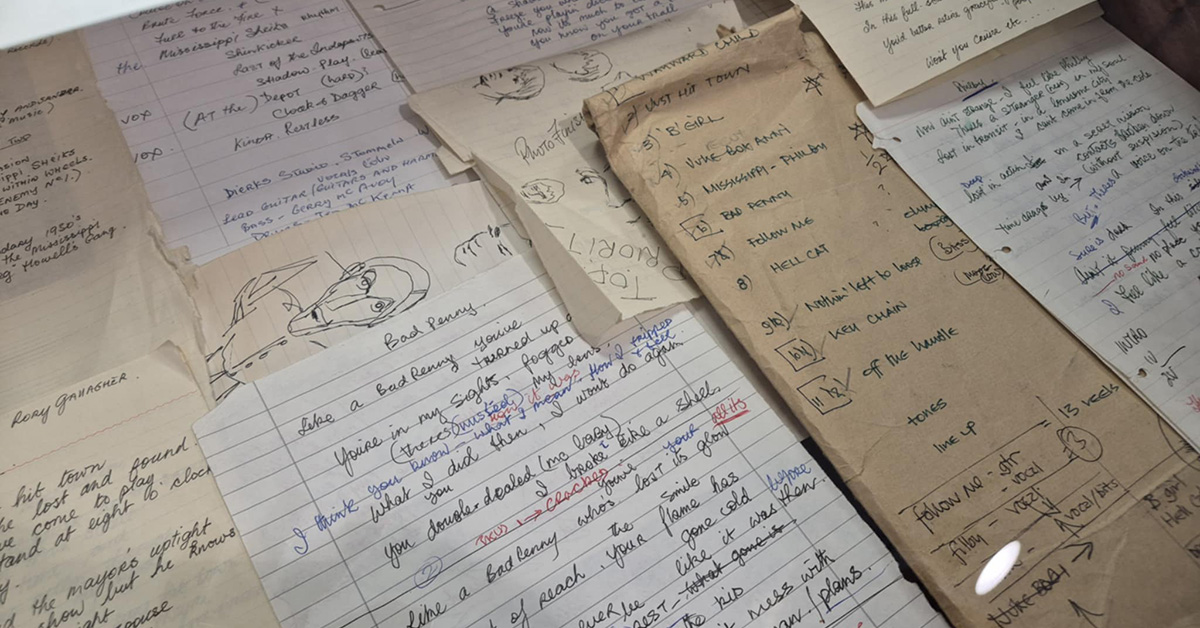
by Lauren Alex O’Hagan
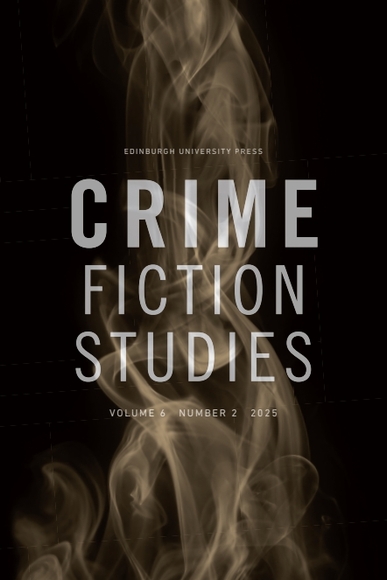
Lauren O’Hagan is the author of Hardboiled Blues: Exploring Ian Rankin’s ‘Novel’ Approach to the Music of Rory Gallagher, the featured article in issue 6.2 of Crime Fiction Studies.
On 14 June 2025, fans around the world marked 30 years since the passing of Irish blues-rock legend Rory Gallagher. In his adopted hometown of Cork, the anniversary was commemorated with Cork Rocks for Rory – a citywide tribute curated by the Gallagher estate in conjunction with Cork City Council. Events included exhibitions, live concerts, guitar workshops and a permanent walking trail, all celebrating the multifaceted legacy of the beloved musician.
Lyrics, Vinyl and Visuals
Among the tributes, my personal favourite was Lyrics, Vinyl and Visuals – an exhibition housed at Cork City Library that offered a reappraisal of Gallagher’s songwriting by tracing its roots in the hardboiled fiction he loved. On display were paperbacks from his personal collection, alongside original handwritten lyrics and artwork from Kickback City (2013), a multimedia boxset pairing his music with a noir novella by Ian Rankin.
While Gallagher is rightly celebrated as one of the greatest guitarists of the 20th century and “Ireland’s first rockstar,” his reputation as a musician has often eclipsed serious discussion of his songwriting. Critics have unfairly dismissed his lyrics as “obscure banality” or mere vehicles for extended solos. But this exhibition – and broader reflection on Gallagher’s influences – challenged that view, revealing how his love of hardboiled fiction shaped a gritty, emotionally rich songwriting style that deserves recognition as a distinctive form of hardboiled blues storytelling.
There’s something incredibly intimate and revealing about seeing Gallagher’s lyrics in his own hand – scrawled in black or red ink, with lines crossed out, reworded or linked by arrows. You can almost trace his thought process as you read alternate titles, bracketed ideas and fragments jotted down in the margins. Similarly intimate are the novels themselves – well-worn Corgi, Pan and Penguin pocketbooks by authors such as Raymond Chandler, Dashiell Hammett, Patricia Highsmith and Mickey Spillane. Gallagher’s guitar case was often filled with such books on tour, with reports of roadies injuring their backs from unwittingly picking it up!
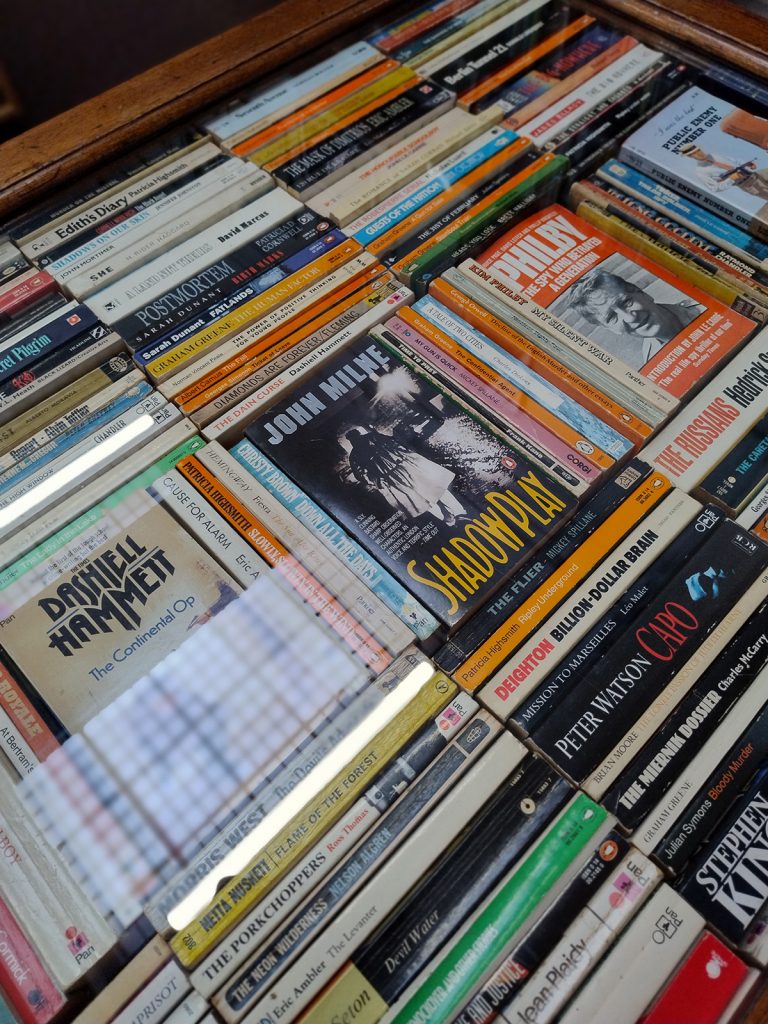
Noir Storytelling and the Outsider’s Voice
While early blues musicians often addressed violence and injustice through autobiographical storytelling (often as a way to reclaim agency, as musicologist Mack suggests), Gallagher turned instead to fiction. He channelled the style, attitude and psychology of hardboiled detectives in his lyrics to create lyrical worlds shaped by crime and corruption, peopled by gangsters, drifters, femme fatales and loner detectives.
These noir-inflected characters offered a subtle commentary on Gallagher’s own disillusionment with the manipulative, morally murky music industry. Wary of its commercial machinery, he rejected singles, music videos and Top of the Pops appearances, preferring to “duck and weave in and out of [the industry] to survive.” That outsider stance sharpened his lyrics, many of which adopt first-person narration, wisecracking tones and a streetwise vocabulary reminiscent of Chandler or Hammett’s protagonists who survive by keeping their emotional distance and playing by their own moral code.
Gallagher’s lyrics never glamorised violence; instead, he focused on the psychological strain of life on the edge – characters under pressure, trying to stay alive or maintain dignity. As Hunter notes, Gallagher’s lyrics:
bewail the cruelty of fate and the unfairness of the human condition. They celebrate outlaws and other outsiders and are leavened with just enough wry humour to prevent them ever collapsing into bathos.
In this way, Gallagher expanded the emotional and narrative possibilities of blues songwriting, pioneering a hardboiled blues subgenre that was distinctly his own. He, therefore, merits recognition both as a master guitarist and a literary craftsman.
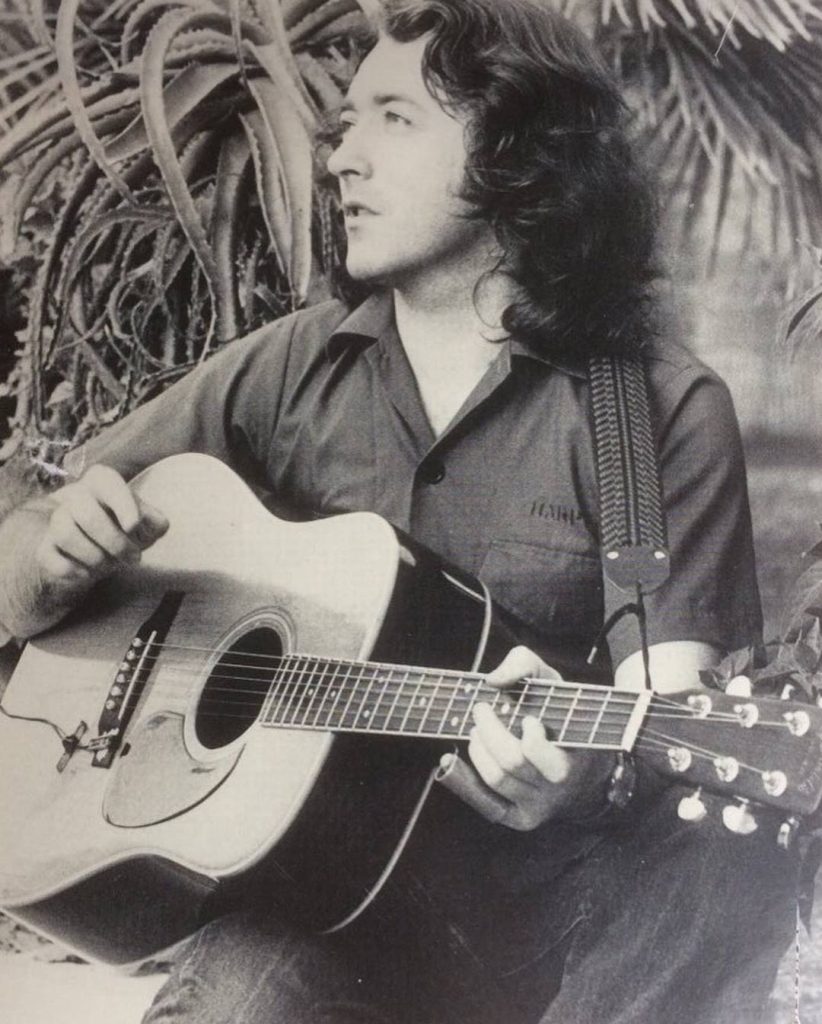
Hardboiled Blues in Five
Below are five Gallagher tracks that best showcase his noir-inflected songwriting:
1. In Your Town (1971, Deuce)
A raw tale of a man freshly escaped from prison, bent on revenge. In live performances, Gallagher would often stretch this into 20-minute storytelling epics, improvising new lyrics and infusing each version with fresh dramatic tension.
2. The Last of the Independents (1978, Photo Finish)
Often mistaken as autobiographical, this song draws from the 1973 film Charley Varrick. The story follows a crop duster who robs a bank and ends up on the run from the mob – classic noir material reimagined in Gallagher’s voice.
3. Big Guns (1982, Jinx)
An ominous, tightly written track that follows a hunted man trying to outrun the mob. “There’s a call out for your head,” the narrator warns. And it’s going to end in one way: “with a lump of lead.”
4. Continental Op (1987, Defender)
Gallagher’s direct homage to Dashiell Hammett’s no-nonsense detective. The Op is called to investigate a body washed up in the bay – an atmospheric tale told in brisk, biting lines worthy of Hammett himself.
5. Kid Gloves (1990, Fresh Evidence)
Inspired by the 1947 film Body and Soul, this track tells the story of a principled boxer who refuses to throw a fight and pays the price when the mob comes after him.
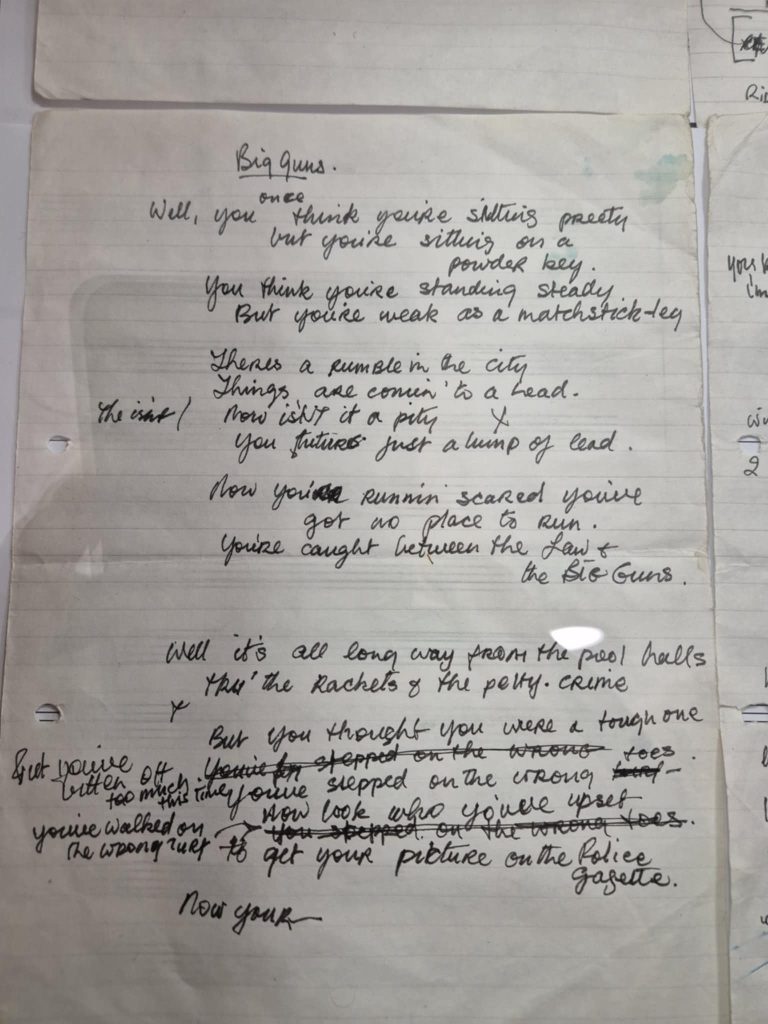

About the author
Dr Lauren Alex O’Hagan is a Research Fellow in the School of Languages and Applied Linguistics at the Open University and an Affiliated Researcher in the Department of Media and Communication Studies at Örebro University. She is the author of ‘Hardboiled Blues: Exploring Ian Rankin’s ‘Novel’ Approach to the Music of Rory Gallagher’, the featured article in issue 6.2 of EUP’s Crime Fiction Studies.


